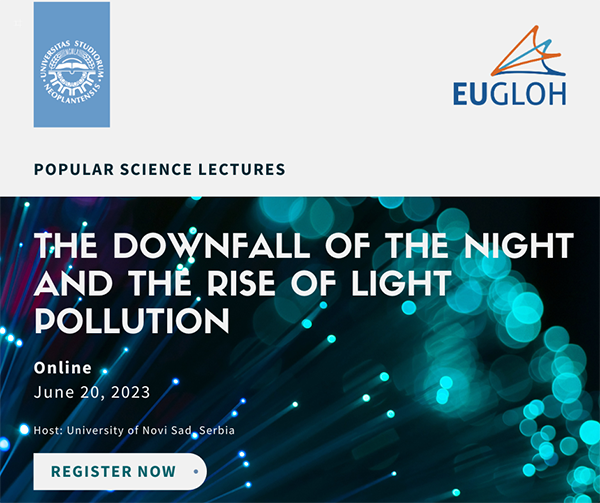
- UNIVERSITY
- MEMBERS
- Faculties
- Faculty of Philosophy
- Faculty of Agriculture
- Faculty of Law
- Faculty of Technology
- Faculty of Economics
- Faculty of Technical Sciences
- Faculty of Medicine
- Faculty of Sciences
- Academy of Arts
- Faculty of Civil Engineering
- “Mihajlo Pupin” Technical Faculty
- Faculty of Sport and Physical Education
- Faculty of Education
- Hungarian Language Teacher Training Faculty
- Institutes
- University centres
- Foundations, funds, associations
- Faculties
- STUDIES
- SCIENCE
- INTERNATIONAL COOPERATION
- CONTACT
POPULAR SCIENCE LECTURES: THE DOWNFALL OF THE NIGHT AND THE RISE OF LIGHT POLLUTION

Within the activities of the EUGLOH project, the University of Novi Sad organizes an online popular science lecture “The downfall of the night and the rise of light pollution”, June 20, 2023 (13:00-14:00 CET) which is open for all academic community of the EUGLOH member universities.
The lecture will be given by Dajana Bjelajac, PhD, Assistant Professor at the Department of Geography, Tourism, and Hotel Management, Faculty of Sciences, University of Novi Sad. Those interested in attended should register by June 19, 2023 at the latest (filled-in registration form should be sent to eugloh.registration@uns.ac.rs).
Details:
Date: 20.06.2023.
Time: 13:00-14:00 CET
Location: Online
Target Group: Students and staff
Host: UNS
Abstract:
Over the last decade, the rise of light pollution has been a significant concern for environmentalists and astronomers alike, as the brightening of night skies has begun to interfere with natural ecosystems and astronomical observations. Studies show that light pollution has increased by an average of 2% per year globally, with urban areas experiencing the most significant illumination levels at night. This rise is attributed to the widespread use of energy efficient LED lighting, which is often used excessively and directed upwards, contributing to skyglow. This lecture provides a comprehensive overview of light pollution, covering its causes, impacts, and potential solutions. The lecture begins with a definition of light pollution and an overview of its different types, including skyglow, glare, and light trespass. The causes of light pollution are then examined, including the growth of urbanization, the use of artificial lighting, and the lack of awareness about its impacts. The lecture then explores the ecological, health, and societal impacts of light pollution, including its effects on wildlife, human sleep patterns, and energy consumption. Finally, the lecture considers various strategies for mitigating light pollution, including using energy-efficient lighting, responsible urban planning, and public education campaigns.
Key Points:
- Definition and types of light pollution
- Causes of light pollution, including urbanization and artificial lighting
- Ecological, health, and societal impacts of light pollution
- Strategies for mitigating light pollution, including energy-efficient lighting and responsible urban planning.
Site map | Copyright © 1998- University of Novi Sad. All rights reserved. | webmaster: webadm@uns.ac.rs


